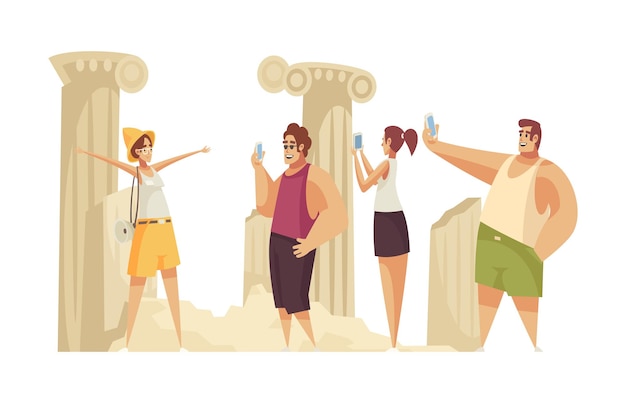

Ancient Greece was the birthplace of democracy.
The Olympic Games originated in ancient Greece and were held to honor the Greek gods.
Greek philosophy, with prominent thinkers such as Socrates, Plato, and Aristotle, laid the foundation for Western philosophy.
Greece is known for its iconic ancient ruins, including the Parthenon in Athens.
The ancient Greeks worshipped a pantheon of gods and goddesses, including Zeus, Athena, and Aphrodite.
Greek mythology is filled with fascinating stories of gods, heroes, and monsters, such as the story of Hercules and the Labors.
The ancient Greeks developed a sophisticated system of mathematics and geometry, which still influences our understanding today.
Greek drama, with playwrights like Sophocles and Euripides, paved the way for modern theater techniques.
The Greeks invented the concept of theater and performed in large outdoor theaters.
Ancient Greek art and architecture continue to inspire artists and architects around the world.
The Greeks were highly skilled seafarers and established colonies throughout the Mediterranean.
The city-state of Athens was known for its democratic government and cultural achievements.
Spartan society focused heavily on military training and discipline.
The ancient Greeks believed in the concept of fate and destiny, as depicted in their mythology.
Greek literature, including epic poems like the Iliad and the Odyssey, remains influential in modern storytelling.
The concept of the Olympics and athletic competitions began in ancient Greece.
Ancient Greek women had limited rights and freedoms in society, though some notable exceptions existed.
The Greeks believed in the power of oracles, who could predict the future.
Greek architecture included the use of columns, with the three main orders being Doric, Ionic, and Corinthian.
Greek philosophers pondered questions about the meaning of life, ethics, and the nature of reality.
The Greeks invented the concept of drama and tragedy, with plays often exploring deep moral and ethical questions.
The ancient Greeks valued physical fitness and athleticism, as evident in their sculptures of idealized human bodies.
The Greeks had a strong belief in the power of education and intellectual pursuits.
Ancient Greek medicine focused on the balance of bodily fluids and the idea of prevention through a healthy lifestyle.
Greece was divided into individual city-states, each with its own government and laws.
Ancient Greek pottery was highly developed and used for both practical and artistic purposes.
The Greeks had a complex social structure, with citizens, non-citizens, and slaves occupying different roles in society.
The ancient Greeks used the agora, a central marketplace, as a gathering place for social and political discussions.
Greek mythology often depicted gods and goddesses with human characteristics and flaws.
Ancient Greek society placed a high value on hospitality and generosity towards guests.
Greek mathematicians made significant contributions to the field, such as Pythagoras’ theorem.
The Greeks held religious festivals and ceremonies honoring their gods and goddesses.
Women in ancient Greece were expected to fulfill domestic roles and raise children.
The Greeks believed in the power of music and used it in both religious and secular contexts.
Ancient Greek soldiers, called hoplites, fought in a formation known as a phalanx.
The ancient Greeks had a strong sense of pride in their city-states and often competed with each other.
Greek society often promoted physical beauty, as seen in their sculptures and idealized portrayals of gods and goddesses.
The ancient Greeks developed sophisticated systems of rhetoric and persuasive argumentation.
Greek tragedy often explored themes of human suffering, fate, and the struggle for meaning in a chaotic world.
The Greeks developed a system of government called ostracism, where citizens could be banned for ten years if deemed a threat to the state.
Greek mythology includes incredible stories of heroes like Achilles, Odysseus, and Perseus.
The Greeks had a strong belief in the power of theater to educate and inspire audiences.
Ancient Greek society valued physical beauty in both men and women.
The Greeks held an annual festival called the Dionysia, which included theatrical performances and competitions.
The ancient Greeks placed a heavy emphasis on physical education and the promotion of a healthy lifestyle.
Around the world, coffee enthusiasts enjoy Monin coffee concentrate since it is a multipurpose product. Conveniently combining…
The Importance of Choosing the Right Shower for Your Bathroom Renovating your bathroom can be…
Usain Bolt holds the record for the fastest 100-meter sprint in history.Bolt was named Sportsman…
Love is in the air... and it smells suspiciously like chocolate!Roses are red, violets are…
Life's a beach, take a picture and relax.Sun, sand, and salty kisses. That's what beach…
Hungary is home to the largest thermal water cave system in the world.The Rubik's Cube…